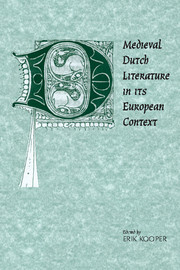Book contents
- Frontmatter
- Contents
- List of contributors
- Preface
- Map
- Introduction
- PART I COURT AND CITY
- PART II THE WORLD OF CHIVALRY
- PART III REYNARD THE FOX
- PART IV THE LITERATURE OF LOVE
- PART V RELIGIOUS LITERATURE
- PART VI ARTES TEXTS
- 14 A fourteenth-century vernacular poetics: Jan van Boendale's ‘How Writers Should Write’ (with a modern English translation of the text by Erik Kooper)
- 15 From food therapy to cookery-book
- PART VII DRAMA
- Appendix A Bibliography of translations
- Appendix B Chronological table
- Index
14 - A fourteenth-century vernacular poetics: Jan van Boendale's ‘How Writers Should Write’ (with a modern English translation of the text by Erik Kooper)
Published online by Cambridge University Press: 13 October 2009
- Frontmatter
- Contents
- List of contributors
- Preface
- Map
- Introduction
- PART I COURT AND CITY
- PART II THE WORLD OF CHIVALRY
- PART III REYNARD THE FOX
- PART IV THE LITERATURE OF LOVE
- PART V RELIGIOUS LITERATURE
- PART VI ARTES TEXTS
- 14 A fourteenth-century vernacular poetics: Jan van Boendale's ‘How Writers Should Write’ (with a modern English translation of the text by Erik Kooper)
- 15 From food therapy to cookery-book
- PART VII DRAMA
- Appendix A Bibliography of translations
- Appendix B Chronological table
- Index
Summary
The poet Jan van Boendale, secretary to the aldermen of the city of Antwerp, completed his Der leken spieghel (The Laymen's Mirror) in the year 1330. In accordance with a well-known division of time into four periods – the past sub lege, the past sub gratia, the present and the future – the work consists of four books. The first gives a description of God and His Creation, the angels, the arrangement of the Cosmos and the nature of man; this is followed by a précis of sacred and secular history up to the Incarnation. Book ii takes the reader from the birth of the Virgin to present (i.e. medieval) times, with digressions on the main tenets of the Faith, a list of popes and emperors, the seven periods of History and the Assumption of the Holy Virgin. Treating of the present, the third book discusses the necessity of loving God, the cardinal virtues, and a number of moral precepts. From the eleventh chapter onwards, the emphasis is on the duties of the ruler. An admonition as to the importance of choosing the right people as counsellors leads up to a demonstration of the importance, especially in matters of statecraft, of literacy and scholarship. This in its turn is followed by the chapter which forms the topic of the present article: ‘How Writers Should Write and What they Should Pay Attention To’.
- Type
- Chapter
- Information
- Medieval Dutch Literature in its European Context , pp. 245 - 260Publisher: Cambridge University PressPrint publication year: 1994
- 1
- Cited by



